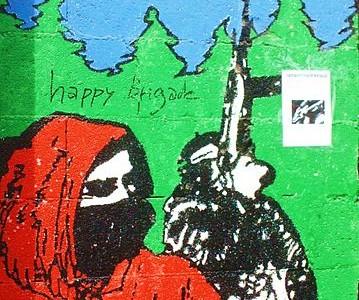Spanish facing major changes as elections loom and Basque terror ends
The Basque terrorist group ETA has historically enjoyed some popular support, as evidenced by this mural, but that has waned in recent years. (Photo from Wikimedia Commons.)
Story from PRI’s The World. Listen to the above audio for a complete report.
Change is in the air in Spain. Next month, the country holds general elections.
The vote could oust the Socialist Party from power, and usher in a new conservative government in Madrid.
But the biggest change may be the end of separatist Basque terrorism in Spain.
Last week, the Basque terrorist group ETA announced the end of its decades-long campaign of violence.
A combination of police work and international cooperation has helped bring ETA to its knees. Now, Spanish politicians of all stripes are seeking credit for the group’s apparent demise.
In today’s world of terrorism, ETA barely appears on the radar. But the Basque radicals have killed 829 people in a half-century of fighting. Al-Qaeda has killed more in a single day.
But Cristina Manzano, editor of the Spanish-language version of Foreign Policy Magazine, said Americans shouldn’t dismiss the damage ETA wreaked on Spanish society.
“If you haven’t lived with this thing around. I mean, hearing bombs. With the threat of going in the street and seeing people surrounded by cops because they were threatened and so on, I think it’s difficult to understand,” Manzano said. “Myself, I was at home one day and there was a bomb two blocks away.“
ETA has been killing since the 1960’s, despite various governments’ attempts to crush the group. But in recent years ETA has weakened. The movement’s goal of Basque succession has never been shared by a majority of Basques. And many who did support them have grown tired of the violence.
At the same time, Manzano said, international cooperation against terrorism has increased. For decades ETA killed in Spain, but hid in France. The French considered them separatists, not terrorists. But after years of negotiations, France changed its mind. The French began cracking down, sharing intelligence and making arrests.
“The minute the French authorities started to chase them, they had to start hiding,” she said. “They were also under the surveillance of French authorities. And that was very, very important.”
Manzano said the fact that France finally saw ETA in a global context reflects a larger shift in how the world deals with terrorism.
Over the last three years, hundreds of ETA activists have been jailed, including several of its top leaders. Leading that fight was Spanish interior minister Alfredo Perez Rubalcaba. Today, Rubalcaba is the socialist party candidate for Prime Minister. Elections are next month. Rubalcaba has not forgone his chance to use ETA’s statement to boost his own credentials.
“If my work has in any way contributed to ETA’s end, and it certainly has,” he said, “then I can say that my entire political career has been a success.”
Not to be outdone, Rubalcaba’s rival, the conservative Popular Party leader Mariano Rajoy, is trying to take credit too.
“This is good news,” he said, “that we have succeeded in getting ETA to renounce its policies of death, fear, violence and exclusion.”
In fact, since Spain became a democracy in the late 1970s, both major political parties have failed to stop ETA. Which is partly why victims of ETA violence are marching this coming Saturday. ETA has broken promises of peace before. Those hurt by the terrorist group say politicians of all stripes have used them to get elected.
———————————————————-
PRI’s “The World” is a one-hour, weekday radio news magazine offering a mix of news, features, interviews, and music from around the globe. “The World” is a co-production of the BBC World Service, PRI and WGBH Boston. More about The World.
